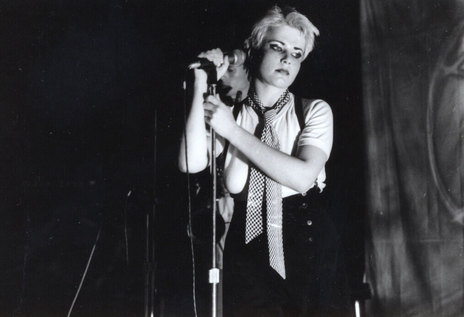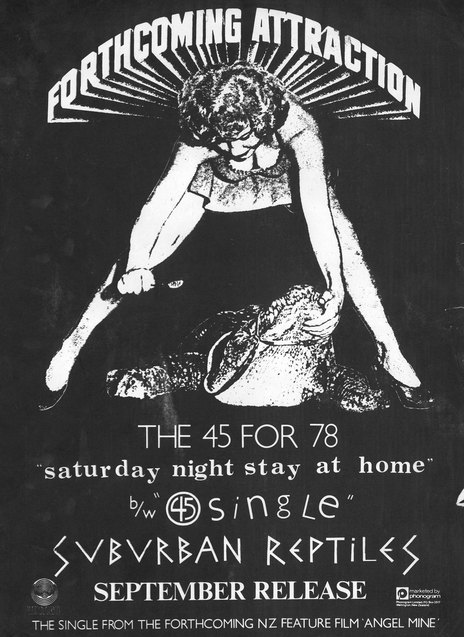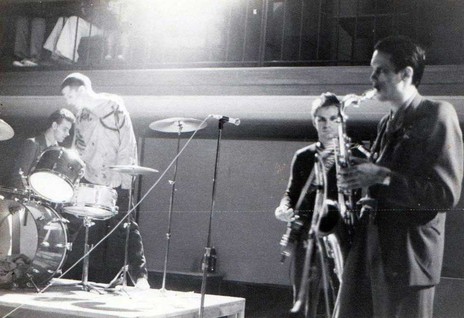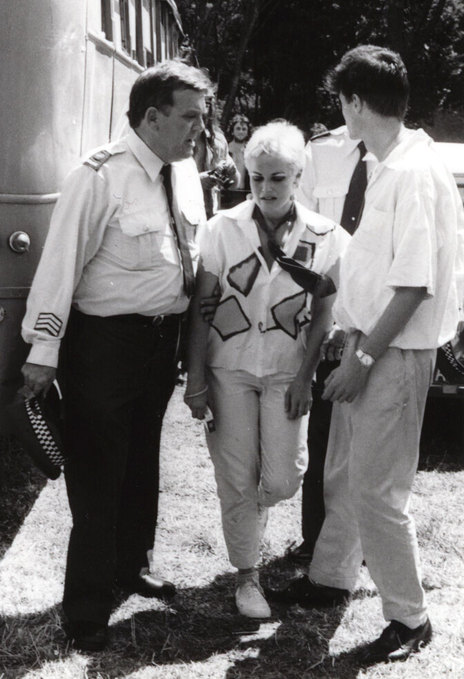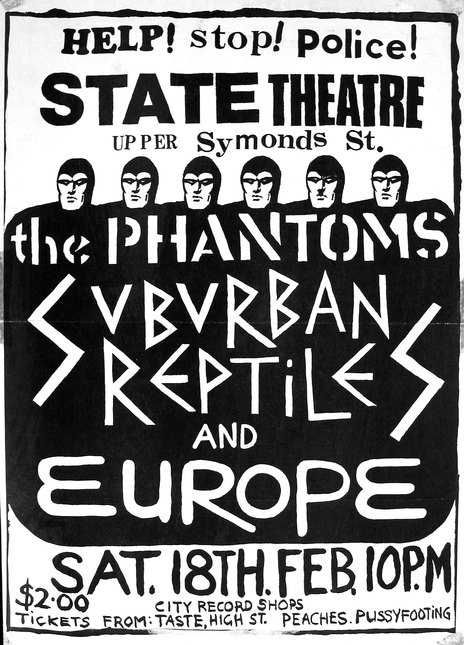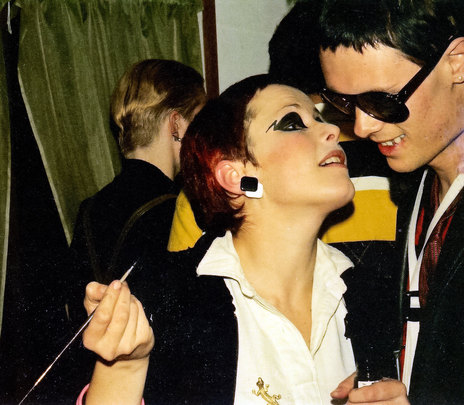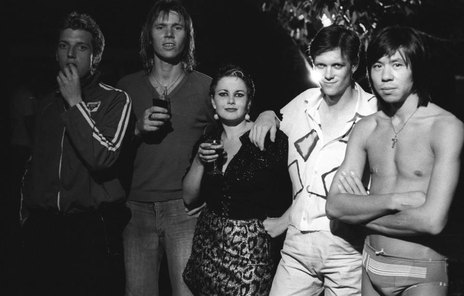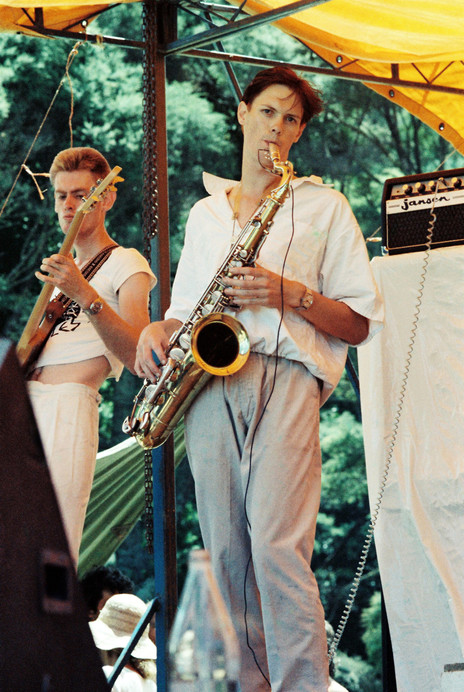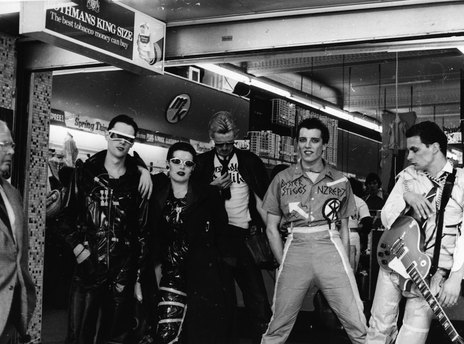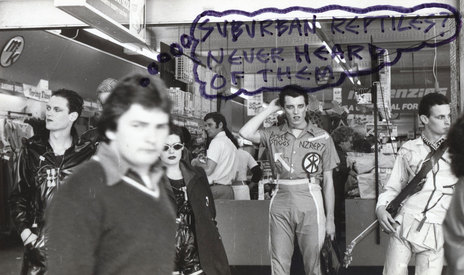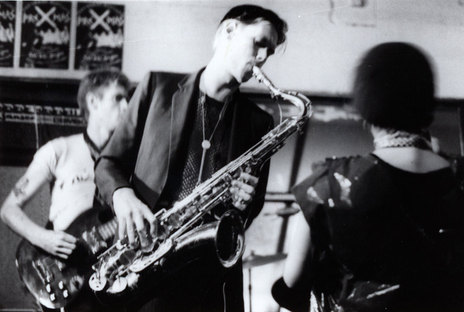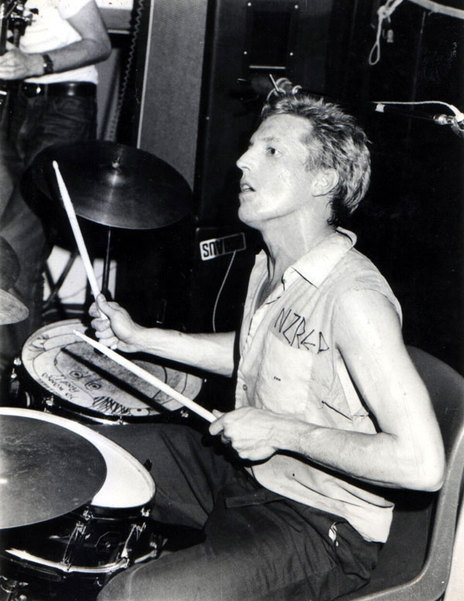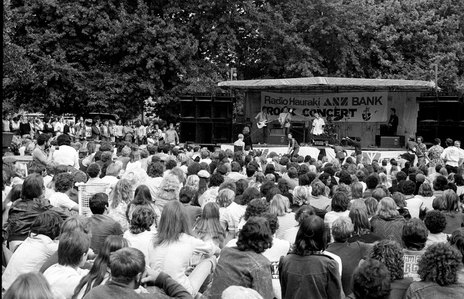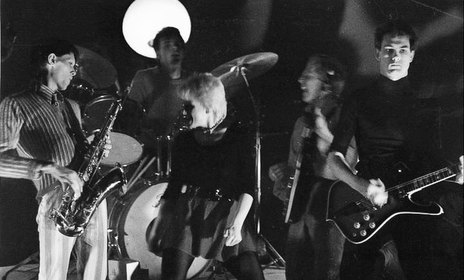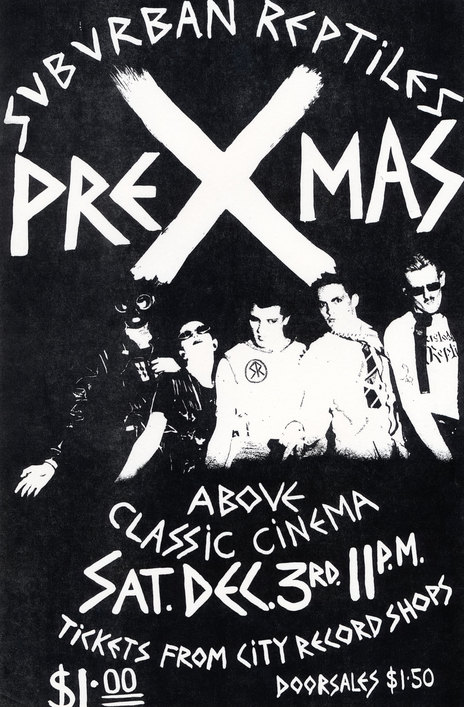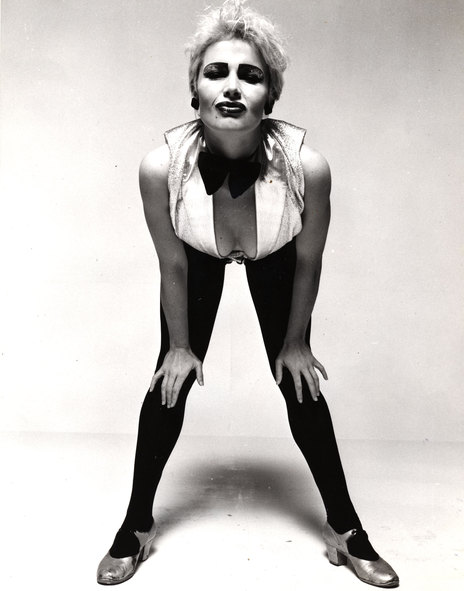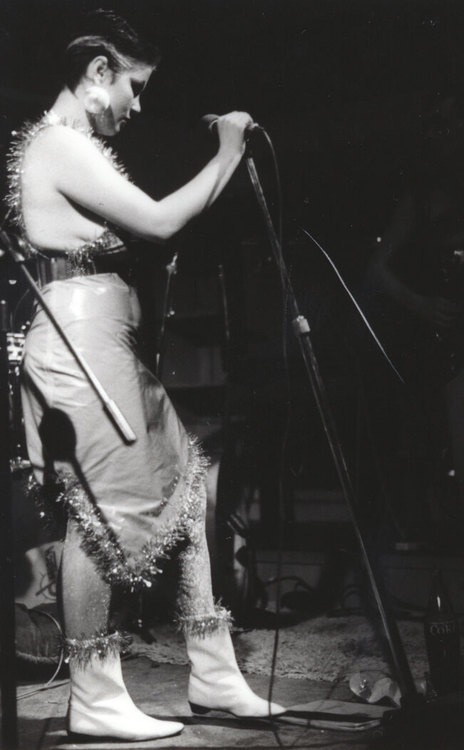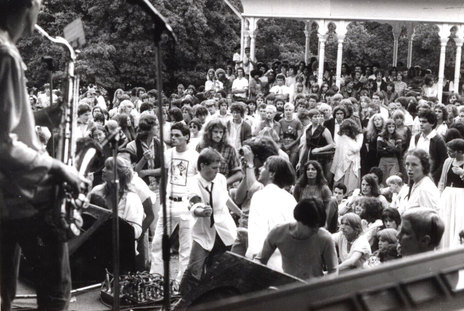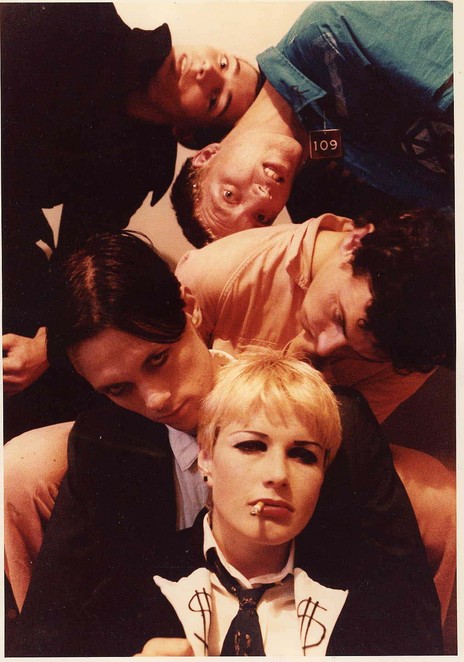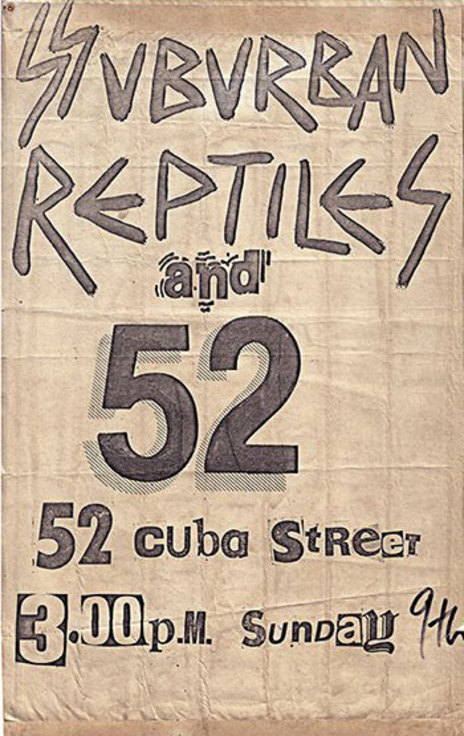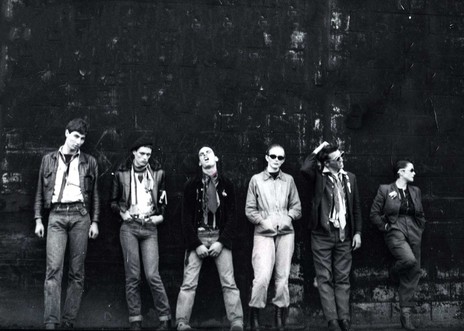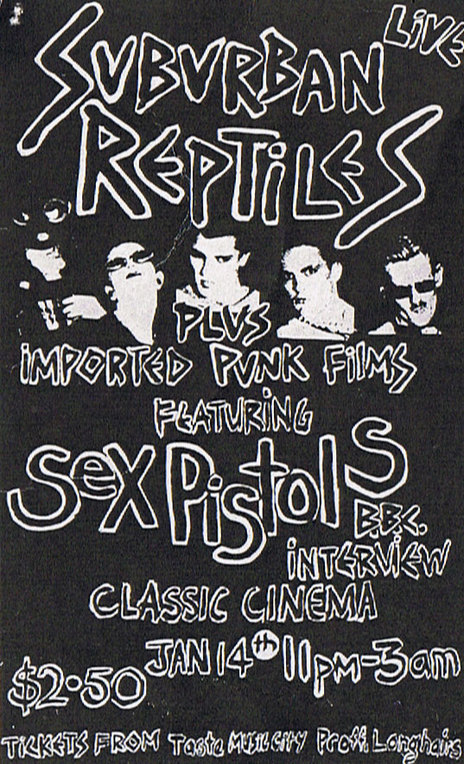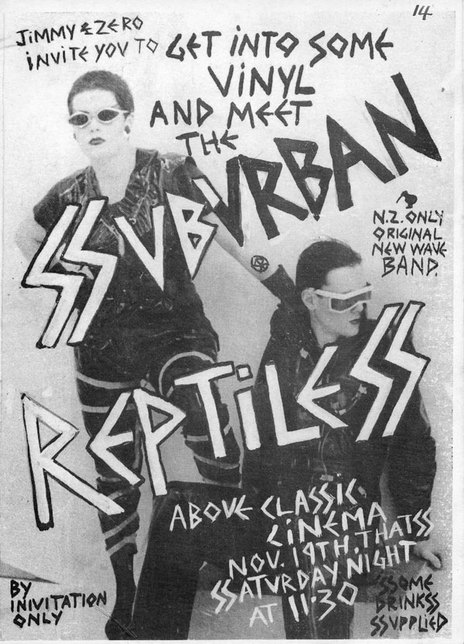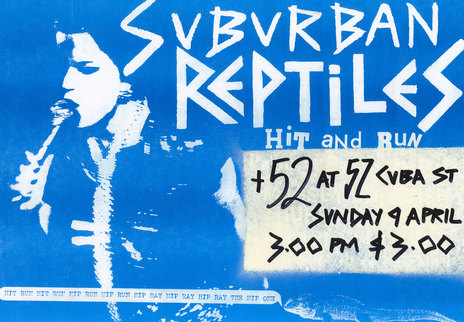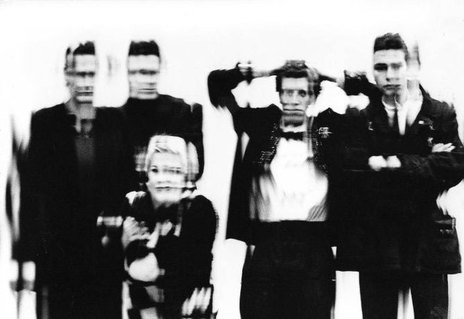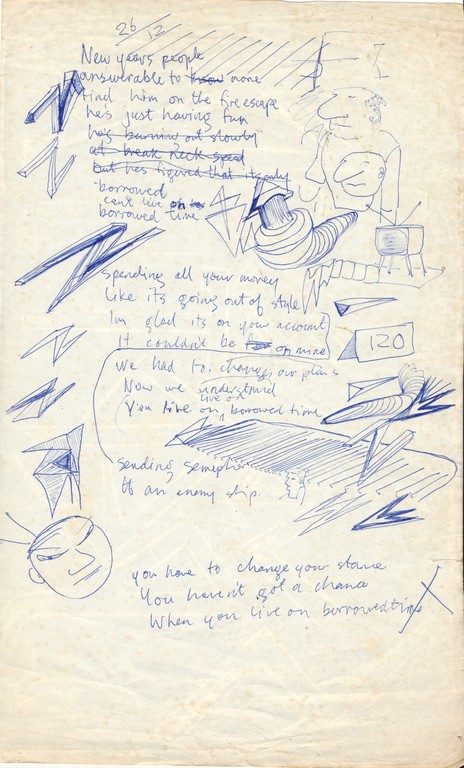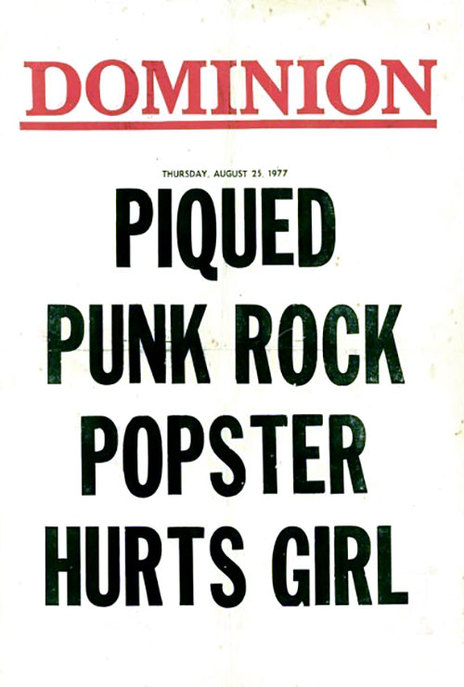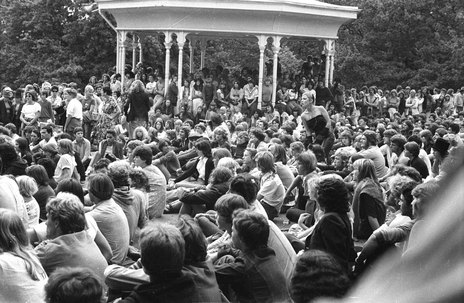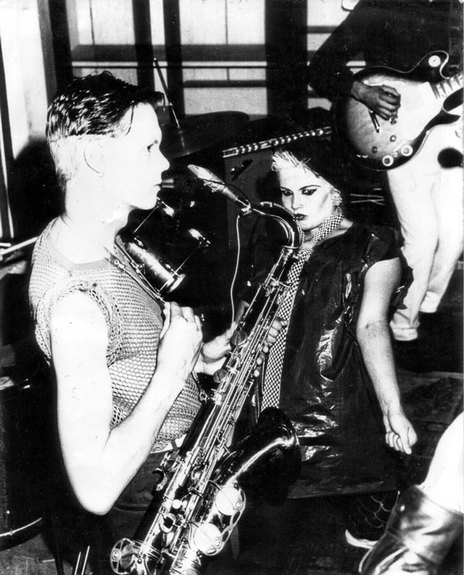This meant that when New Zealand’s first two punk bands, the Suburban Reptiles and The Scavengers, formed in Auckland at the start of 1977 they did so relying on three-month-old snippets of news from UK weekly magazines such as the New Musical Express (NME) and Melody Maker, with little real access to the audio that had created the buzz.
While most of the rest of the country seemed unaware that anything was afoot offshore, a handful of Auckland art and design students, inspired by the words they were reading, independently formed two bands. Neither knew – at least for some months – that the other existed.
The way each band responded to what was happening offshore differed substantially, both in form and content. One, The Scavengers, formed at the graphic design school at Auckland Technical Institute, were more traditionalist, playing mostly cover versions of UK and US garage and pre-punk before the UK variety became available, whereupon they expanded their repertoire to include some of those records.
The other, the Suburban Reptiles, was formed by a handful of former and current Auckland University students. Apart from a trio of heavily reworked cover versions (one each from Roxy Music, The Stooges and The Rolling Stones), all quickly dropped, the Reptiles’ repertoire was self-composed and owed little to UK punk, drawing more from glam and art-rock influences like Bowie, Kraftwerk, early Roxy and Eno with a scattering of Velvet Underground and Stooges.
The Scavengers positioned themselves as more traditionally working class, whereas the Reptiles parodied the stance in the press. Since both bands came out of Auckland tertiary institutions, and probably came from similar backgrounds – quite middle class – this was, in both cases, a conscious stance. Of course, The Scavengers could actually play their instruments too – but hey, let’s face it, lack of musical ability never held a punk band back.
Suburban Reptiles form
It was mostly social chatter rather than a serious statement of intent, but Brett Salter and Simon Grigg had talked of a jazz band. Neither was musically proficient although Salter played rudimentary saxophone. Little came of this until late 1976 when a mutual friend, the aspiring film director David Blyth, reading the NME at Grigg’s flat, noted a tiny live review of the Sex Pistols and showed Grigg. Deciding that this punk thing had more going for it Grigg immediately went around to Salter’s Ponsonby student flat to do a pitch on “punk” and the stillborn jazz band was henceforth a punk act.
The name took a little longer to arrive, but the Suburban Reptiles were formed that evening with Salter’s partner Clare Elliott on vocals and flatmates Will Pendergrast (who put his hand up to play bass) and Trish Scott (rhythm guitar) joining. Another art student, Brian Nicholls, was soon added on lead guitar. Grigg nominated himself as manager and filled in on drums at early practices before hiring Des Edwards, an apprentice butcher – because he seemed to have a rhythm noted whilst he was preparing schnitzel – as the drummer.
The band had its first exposure to actual UK punk around this time, when Tim Blanx, a New Zealander working as Bryan Ferry’s assistant, arrived back in Auckland with a handful of records from the likes of The Damned which were duly taped.
The only gig with this first line-up was an abortive attempt to gatecrash an Auckland University Café evening show by Th’ Dudes. Grigg arranged with Th’ Dudes’ Peter Urlich for a power lead to be passed out of the venue as they finished which would allow the Suburban Reptiles’ to play in the university quadrangle to an exiting still amped up crowd. The university’s caretakers killed that idea quickly with the punks playing just two songs before the power went off. The band then removed themselves to The Scavengers’ practice rooms – the bands had met accidently that week – where they were fully exposed to the Sex Pistols records for the first time.
Buster arrives
It was quickly apparent that Edwards was not a drummer despite his rhythmic skills at work and he was politely sacked (he went on to drum with Junk and then found an unlikely career as a professional juggler in Australia).
The band had also adopted, in perhaps their only nod to punk norms, appropriate stage names: Brett Salter was henceforth Jimmy Vinyl (later Lino Clone and then Jimmy Joy), Clare Elliott was briefly Sally Slag before she settled on Zero (or Zero Zone), Will Pendergrast was Billy Planet, Trish Scott was Sissy Spunk, Brian Nicholls was Shaun Anfrayd, and Simon Grigg became simply Symin, and his one-man management entity was tagged Partisan Politik.
Approaches by Grigg to local record companies EMI and Phonogram at the time were met with vague interest from the former, a company whose UK parent had signed and been burnt by the Sex Pistols. EMI had recovered enough to have a roster that now included Australian heroes The Saints and a Live At The Roxy album which they saw fit to issue in New Zealand in May or June 1977. Phonogram, in a meeting, asked Grigg to provide demos and suggested that the New Zealand band consider covering UK punk singles for local release. Grigg and the band demurred.
Buster Stiggs’ arrival as a replacement drummer was regarded as accidental at the time: Jimmy and Zero announced they’d found a prospective drummer in Auckland’s Queen Street. He had, they said, noticed them in the street and after a brief conversation, asked to join. In later years Stiggs would claim he’d engineered the meeting, although, given the Suburban Reptiles’ almost non-existent profile at the time, that’s perhaps doubtful. Stiggs, born Mark Hough, was formerly a guitarist and pianist in After Hours with Neil Finn, and came complete with a new practice room – his front room where Split Enz had rehearsed before they’d gone to the UK – and bonus gear left behind by the Enz, quickly adopted by the band.
The first gig with Stiggs was June, at a private party in Massey, West Auckland, where the less than polished band managed to clear the room of even the curious – and there were a few – with a repertoire of the handful of heavily reworked covers and a dozen or so original tunes.
The gig that threw the Reptiles into a barrage of media was a school ball at a Catholic boys’ college
The Elam School of Fine Arts mid-winter Christmas party followed, a show that was filmed by film-student Gray Nicol (although the footage seems to be lost). Then came the gig that threw the band into a barrage of media, a school ball at the Catholic boys’ school, Marcellin College.
Booked by Grigg, via Benny Levin’s agency – Grigg had sold the band to the veteran agent as “urban blues” – the school pulled the plug after some 40 minutes and then called the police to escort the band from the premises. Latching onto the possibility of the event, Grigg called the tabloid media.
“And they couldn’t even play rock and roll!” raged the bold headline on the front page of the next edition of the populist Saturday evening paper The 8 O’Clock, quoting the school’s spokesman, one Brother Humphrey.
That paper soon had company: during the week the Suburban Reptiles had played an afternoon show at the University’s Maidment Theatre, tailored for the media. Grigg had invited them all along and then to a “meet-the-band” event afterwards, complete with heavily fictionalised band bios. The timing was right, with the local press increasingly aware of the horrified noise in the UK around the British punk bands, notably The Sex Pistols.
On the Sunday, the band were on the front pages of the Sunday News and the Sunday Times, both of which featured wild stories (“they sniff cleaning fluid sent over by the Ramones before strangling seagulls at the wharf” was one) taken from the interviews and bios provided by the band at the Maidment show. A media burst followed over the next few weeks with The Scavengers featuring heavily too. The UK’s “filth and fury” had arrived in New Zealand, at least as far as the press was concerned. Initially treated with some humour, it would quickly become a burden to both bands, and an increasingly dangerous one in the months ahead.
On 16 July 1977, the Suburban Reptiles, The Scavengers and a third punk band, The Masochists, performed at the first major New Zealand punk gig, at Auckland University Café. Promoted by Grigg and David Blyth to raise money for the latter’s forthcoming arthouse movie Angel Mine, it once again found the Reptiles in the Sunday press, and saw all three bands banned from the university as performers. The Suburban Reptiles would never play there again.
Continual line-up changes meant that Zero was the only member of the band throughout its lifespan and in late July original guitarists, Trish Scott and Brian Nicholls both quit. That meant the band had no guitarist, so The Scavengers’ Johnny Volume was co-opted, to the displeasure of his own bandmates who felt he should be concentrating on them exclusively. Still, it was indicative of the strong camaraderie between the small number of Auckland punks, numbering perhaps under 30 at this time, although growing daily.
Taking Wellington by storm
This was the line-up – Zero, Jimmy, Billy, Johnny and Buster – that Grigg took down to Wellington’s Victoria University for the Student Arts Festival in late August. Booked to play two shows, they bused down to find that the organisers had neither accommodation or budget for the contracted gigs. A heated discussion eventually saw the band confirmed for an afternoon gig – bizarrely after prog-rockers Living Force – in Victoria’s Union Hall on the late afternoon of August 24. Accommodation was offered by two teen boys in a Newtown house owned by an alcoholic parent: seven sleeping in a single room on mattresses (Buster Stiggs had found more comfortable accommodation across town).
Over the next week, freezing cold and lacking money, the band was forced to find food where they could, which meant eating in sandwiches in café queues before the register, a soup kitchen and raiding a VIP party at the university (before being evicted) until finally being given the funds originally promised towards the end of the seven days.
The band’s first gig in the city was on the Sunday. Elvis Presley had died the previous week and Ziggy’s in Vivian Street was holding a memorial gig. Organisers Edd Morris and Simon Morris invited the Auckland band to play, which they did, adding punk-fuelled distress to the already mourning Wainuiomata bobby soxers and teds. A fight erupted on the dancefloor and the Suburban Reptiles were forced to retreat to the kitchen, whereupon Morris, more impressed than his crowd, offered the Reptiles another gig, later in the week supporting his band The Heartbreakers at their weekly residency at a pub, The Cricketers’ Arms.
The rest of The Scavengers had also arrived in the city on Sunday – dramatically, as their car caught fire in Vivian Street and was covered the next morning in The Dominion, the first story in a week that saw the Auckland punks on the front pages of the Wellington press every day. A small grouping of Auckland fans had also followed and the capital – which was still largely divorced from the punk soundtrack growing in Auckland – kicked back.
“Piqued Punk Rock Popster Hurts Girl” – the Dominion
The Suburban Reptiles’ only show at the festival was unintentionally dramatic. After a local soundman decided that the music being created by the band was unacceptable and pulled the plug, drummer Stiggs threw his drumsticks into the crowd, one of which hit – accidentally – a woman. The incident itself was largely a non-event although the woman visted and was discharged from hospital, and the crowd quickly dispersed. That, however, was the not the end of it all: the next morning's Dominion billboard proclaimed “Piqued Punk Rock Popster Hurts Girl”. The incident was elevated in the story to an aggravated and intentional assault by punk drumstick in which the victim had almost lost an eye. It was complete nonsense, but it caused a threatening atmosphere immediately with the police warning Grigg that several groups were hunting the city to send the northerners packing by force. A local radio station was soon broadcasting news of the incident as a "punk assault".
That evening Johnny Volume was assaulted in the university toilets by a group of guys clearly on the hunt for “punk rockers” and, just as obviously, not students.
On Thursday evening, the Suburban Reptiles supported The Heartbreakers and were warned by the venue security when leaving that cars had been outside with the passengers asking after the band. The bouncers had told them the Reptiles had left.
As the papers published the image of the battered guitarist, the Auckland bands headed north, to the safety of a slightly more forgiving Queen City.
Billy Planet described the trip down-country (to Rip It Up in October 1997) as “… Wellington. Hippies everywhere. Still all tassles and beads. Fucking hippies ..."
The trip’s only upside was a recommendation by Simon Morris that Grigg visit Phonogram’s head office in the capital. He did, and while the company was still non-committal, it ended with an agreement that he would take demos into the Auckland office as soon as he could on his return. In touch with what was happening offshore, the record industry didn’t quite know what to make of punk, still, but they knew they had to make something of it as soon as possible.
Told what to do by the Megaton
The week after the Reptiles’ return, they entered a small four-track studio, Harlequin, in Auckland’s Mt Eden Road, and there, in an all-night session on September 2, the band recorded four tracks: ‘Megaton’, ‘Desert Patrol’, ‘Razor Smile’ and ‘Coup D’état’. The story was given out that Tim Finn had “produced” the session, but the truth was the Enz vocalist was in town and Buster invited him along. Jetlagged, he soon fell asleep and left when he awoke. The session was largely recorded and produced by the studio’s owner Doug Rogers and the band themselves. Johnny Volume was supposed to play the guitar on the session, but his fellow Scavengers objected and all he contributed was a guitar amp and a guitar, loaned to Billy Planet who played both bass and guitar on the session.
Demo tape in hand, Grigg first approached the bigger EMI again but hit a wall of disinterest so he reached out to Phonogram after the Wellington suggestion, and met with that company’s label boss, Stuart Rubin, in his Grafton Road office. The band had independently suggested to Rubin by Phonogram’s Colin Lum, a mutual friend. Once again, the band was told to cover another song, and Bob Geldof’s band The Boomtown Rats were suggested. However, the meeting finished with the multinational agreeing to release a single if the band covered the recording costs. With that promise in mind, Harlequin was booked again for October 9.
However, the band had a further line-up change at the end of September when Wayne Stevens (aka Bones Hillman) joined as a bassist, allowing Billy to move to guitar permanently. Bones, a standout bassist from the recently disintegrated Masochists, both solved a problem and added short-term stability to the band.
The final Harlequin sessions (there was a last mixing session a few days later) saw ‘Megaton’ and ‘Desert Patrol’ finished for a single, with Bones playing on the former, a Billy Planet tune. The latter, credited as a Stiggs song but in actuality, a group composition, was essentially their first recording with added vocal overdubs and an intro. As part of the package Grigg insisted that Phonogram press the record on a 12-inch single, the first issued by any label in New Zealand, and that it appear on the Vertigo imprint with the Roger Dean designed “spaceship” label, raising a sly punk finger to a design created for Vertigo’s despised prog-rock roster.
Around this time Grigg sent a small press package of photos and posters, plus a fanzine he and Stiggs had created, to the UK music press. The NME printed a slightly dismissive short paragraph about the rise of punk in the antipodes, mentioning the band. The idea that punk had a very distant southern footprint seemed somewhat absurd to the London hipsters.
The gigs in the last few months of 1977 were sporadic, with appearances at Crofts nightclub in Airedale Street and a new venue, a failing disco in Newton Road which Grigg and the disco’s manager had somehow contrived to make Auckland’s first punk venue. It lasted a few weeks. The number of “punks” in the city was still well under 50 – but growing – which did not a regular viable audience make.
The media blitz slowed a little as both Auckland bands had worked out, after the Wellington mayhem, that possibly it had gone a little too far. The police, too, were showing interest and had started heavily harassing the still mostly harmless art-punks regularly, something that would continue for some years. Like the press, the police would have to be kept hopefully at arm’s length. The law would, however, cause problems for Zero in the months to come.
In early November, however, the Suburban Reptiles and friends appeared in an Auckland Star fashion shoot, coordinated by reporter Vanya Hogg. The shoot provided the band with a new set of publicity shots, with Jimmy wearing a gas mask, allegedly because his parents did not yet know he was in the band.
The Classic
The year ended on a high, with a Phonogram contract (ironically never properly signed – the only copy is undated and has made-up names scrawled across it) and a trio of monthly showcase gigs into the new year, this time all in the space above Queen Street’s Classic Cinema. Last used as a rock venue by Hello Sailor in 1976, it was a perfect space that the band had wanted to use since forming. The first of these was on Saturday, 19 November, and the invite (it was tagged as invitation only but that was flexible) suggested you “get into some vinyl and meet the Suburban Reptiles”.
By January 1978 there were at least 10 punk bands playing in Auckland
The second, on December 3, dropped the pretence of Invitation Only, and the third, on 15 January 1978, matched the bands with punk footage from the UK played earlier in the evening. The last two were filled to capacity, indicative of the now-strong punk crowd in the city, heading into the low hundreds. There were now at least 10 punk bands playing in the city.
As late as the early 2000s, a string of black posters from that January show could still be seen taped in the upstairs windows of the Classic, with five faces repeatedly staring down onto Queen Street from a long past musical frontier.
On 2 February, at a party at the very inappropriate Poenamo Hotel, in suburban Northcote on Auckland’s North Shore, Phonogram launched their New Wave campaign, which included, along with albums by the Ramones and others, the ‘Megaton’ 12” single. The record had originally been scheduled for November but repeatedly delayed, then kept back until the New Wave launch. An initial pressing of 200 with the Roger Dean label was followed by 301 with a standard white spiral label. The record sold out almost instantly but failed to chart.
A video of the song was made by TVNZ on the day of the final Classic Cinema show with the band on the balcony of the theatre, but nobody can quite recall who directed it. Indeed, when it was rediscovered in the 2010s, its very existence was a surprise.
Razor smile
On 12 February, the Suburban Reptiles played the Riverhead Rock festival in West Auckland. Whilst the crowd was mixed, the abuse (much of it strongly sexist in nature) and cans from the bogan element elicited a strong verbal response from Zero who told them, repeatedly, to “fuck off”. A perfectly reasonable response to such provocations now, but in 1978 the police did not agree and charged her with using obscene language. She appeared in court on the 13th.
With this hanging over the band, they played a string of gigs over the next months, starting with a State Theatre show on February 18 (in Auckland’s Symonds Street, with Europe and The Phantoms), then a brief residency at the end of the month at Diamond Dogs, a self-styled new wave night spot owned by promoter Hugh Lynn in a club that was formerly Mojos Drag Revue. The club lasted three weeks before Lynn turned it into the more mainstream-accessible Gobbles Disco.
On March 15 they played a Cook Street Market private party, followed a week later by another private party in Hamilton, after which Bones Hillman left the band to join The Assassins, essentially his old band The Masochists renamed. He was temporarily replaced by The Stimulators’ bassist Roland Morris (aka Roland Killeen) in time for a Radio Hauraki Sunday afternoon show in front of some 4500 people in Albert Park on either March 26 or April 2 which was filmed and shown later on Radio With Pictures, although once again the tapes seem to be gone.
A trek down to Wellington, under the quickly appropriate name The Hit and Run Tour, started with three dates in Palmerston North. The first show, on April 6, was to the city’s celebrating but very intoxicated students at their capping dance.
In a sign of how quickly the Reptiles were moving away from the evolving and growing punk mainstream, in 1979 Jimmy recalled, “In May 1978, we play the Massey University capping dance and 600 drunk and safety-pinned-punks-for-the-night call us phonies because we all wear plain conservative suits.”
The sequel was worse: two nights were booked at the-then very tough Awapuni Tavern just south of Palmerston North. The band would only play the first on 7 April with a brawl erupting between the audience and the Reptiles. The tabloid Truth’s version was that crowd objected to the “abuse, obscenities and shoddy music”. The truth was somewhat different with the performers responding to physical and verbal assaults from a small thuggish element in the crowd primed by ongoing media – most especially in rags like Truth – portraying punk rock as violent and almost subhuman. Despite that, the band members successfully defended themselves and turned up to play the next night, but the venue declined the sequel.
On Sunday afternoon, May 9, at 52 Cuba Street in Wellington, the Suburban Reptiles played with the Wellington band 52, led by a friend, Graham Sinclair, finding a city much changed from the 1977 visit, with a growing number of punk and post-punk bands and a very healthy new music scene.
45 single
On their return to Auckland, the Reptiles found themselves without a bass player again when Roland Morris quit to re-join The Stimulators (who had just renamed themselves Sheerlux). He was quickly replaced by Tony Baldock, formerly of Europe, in time for the band to enter Mandrill Studios at the end of the month with Dave Hurley engineering to record Buster Stiggs’ ‘45 Single’, a tune possibly marked for a future single.
In a busy week, the Suburban Reptiles headlined at another new venue, The HQ Rock Café at 52 Upper Queen Street, on May 17 and 18 (a Wednesday and Thursday). They followed that with two nights at Zwines, the punk club in Durham Lane West, on the Friday and Saturday, but found the growing new punk crowd depressingly conservative and derivative. The band had long ago moved past what Jimmy Joy would later call “safety-pin anti-chic”, adding they had become “laughable parodies of what they most believe in.” Punk having become “yet another establishment”.
Continuing the flurry of studio activity around this time too (nobody is exactly sure when, as the studio doesn’t seem to have logged the dates), the group also went into Stebbing Studios in Herne Bay to record a track for the soundtrack of David Blyth’s movie, Angel Mine. The song, ‘Razorblade Rosie’, a wry tale of urban discomfort, was an early Jimmy Joy composition dating from the very first days of the band. Other songs ‘SIS’, ‘Do The Mamba’, ‘We Know What We Want’ and ‘Flash Gordon’ were also quickly demoed at Stebbing, but the tapes, aside from ‘Rosie’, have long proved elusive. The sessions were engineered by Ian Morris. In the Sunday News of May 21, the band announced that ‘Mamba’ and ‘We Know What We Want’ (both Billy Planet songs) were to be the next single. It was not to be.
On June 1, Auckland Magistrate T G Maxwell said, in a seven-page ruling, that Zero’s use of the word “fuck” did not constitute an offence and that “it might not be surprising to hear the word in such a context”.
He finished, “Had the word been used in a more sexual sense to stimulate or arouse the audience, then my view would have been different.” This provided a legal precedent that has allowed New Zealanders to utter the word publicly thereafter.
Saturday Night
One June evening in Wellington, not-yet-disgraced pop star Gary Glitter was watching a kids’ pop show on TV when he felt the urgent need to call the producer of the stage show he was in New Zealand to headline. The show needed one more singer to complete the cast. He told Stewart Macpherson he’d found her, he’d found Columbia: her name was Zero and she was the singer with a band called the Suburban Reptiles.
Gary Glitter, watching TV in WellingtoN, thought Zero was perfect for The ‘Rocky Horror’ tour
Auditioned shortly afterwards, Zero was contracted to appear in the rogue (as in it was not legally licensed) production of The Rocky Horror Show scheduled to tour New Zealand between July and October 1978 but this meant that the Suburban Reptiles would be on hold for much of that time. The show also involved a soundtrack album, recorded in Wellington’s EMI Studios and produced by David Fraser. (The album would chart and oddly a single featuring Zero, ‘Time Warp’, was lifted from the soundtrack as late as 1981.)
Back at Mandrill Studios in mid-June – now with former Split Enz guitarist and songwriter Phil Judd producing – the band started on another Stiggs tune, ‘Saturday Night Stay At Home’. An old school mate of Buster’s, Judd was recently returned from the UK and his studio experiences with Roxy Music’s Phil Manzanera. The song had been chosen by Judd after he’d heard the band playing at Zwines, and was, so Buster would say later, about his dream of being in a band after seeing The Beatles as a child. The sessions and the match-up with Judd would offer up one of New Zealand’s all-time classic 45s and yet eventually prove terminal for the band. While the two are related, it’s very unfair to blame Judd for the latter: he was asked to produce the band, which he did expertly and with fine and timeless results.
The Reptiles appeared once again at The Classic on June 16, this time with The Scavengers, Rooter and The Idle Idols, the latter two bands having been formed by early followers of both the Reptiles and The Scavengers.
Auckland punk headed south again in June when a promoter filled a bus with several bands and took them to the Wellington Town Hall for a show on June 18. The show was called The New Wave Special, and it was filmed for an Eyewitness - Punk TV special that screened Tuesday, June 27, 1978, directed by future TVNZ boss Neil Roberts. The Reptiles appeared on stage and Zero and Buster were interviewed on camera. Tales (accurate) of less-than-ethical approaches by one or two of the production crew in their dealings with some of the female punks in Auckland prior to the journey didn’t make for easy filming.
However, the Reptiles were rapidly falling apart with Billy Planet walking out after an argument with Judd and Stiggs over the guitars on the ‘Saturday Night’ recording which Judd insisted either he or Stiggs play. The reality was it was the final battle in a war over the control of the band that had been building for a year, ever since Stiggs joined, with the two headstrong members barely on talking terms for most of 1978. They would never talk again.
Correctly perhaps, Planet accused Stiggs of attempting to conventionalise the band and move it away from the original concept the founders had of a more radical and experimental project which would reshape musical boundaries rather than conforming to them. Buster had, on the other hand, watched his friends turn the arthouse Split Enz into an aspiring global force and could see no reason why the Suburban Reptiles could not take a similar path. The two visions were irreconcilable. Billy Planet walked out of Mandrill one late June afternoon and would never return. It was announced publicly in the New Zealand Herald on 3 August as was Judd’s arrival as producer. It was the start of the band’s final act.
Recording continued without Planet. Judd and Stiggs played guitar and Judd adding Mellotron to the recording, something perhaps more in line with early Split Enz than the post-punk ethos of the Suburban Reptiles, although the Roxy/Eno strand it represented was certainly not alien to the band. The sessions were finished during breaks for Zero from The Rocky Horror Show.
A video was filmed on August 19 at TVNZ’s Shortland Street studios although, like ‘Megaton’, the director’s name is lost in time. In the video, Judd and Stiggs play guitar and Des Hefner from The Scavengers fills in for the drummer now up front. Phil Judd has always been firm, he was playing as an invited guest, not as a member of the band.
The single was issued on September 22 with the video shown for the first time on Radio With Pictures the following week.
The final act
Meanwhile, Zero continued touring New Zealand with The Rocky Horror Show, with performances in Auckland in August and September, which were in part publicised by a half-page in the Auckland Star on August 24 showing Zero putting on her makeup for the show. During one performance, at Auckland’s His Majesty’s, Zero fell from the stage, injuring herself rather more seriously than she admitted at the time, although she continued performing until the last show in Wellington on October 7, whereupon she returned to Auckland.
In Auckland, Buster had decided to fire Jimmy Joy. The saxophonist told historian Simon Kay in 2015, “Phil Judd didn’t want a sax player in the band. I got a call from Buster after they’d had a practice without me there and I was fired.”
Obviously upset at the drummer taking it upon himself to fire the band’s founder and her partner – without the authority to do so – Zero agreed to continue with the Suburban Reptiles for one final show, at the premiere of David Blyth’s Angel Mine on October 19th at the Civic Theatre. Blyth was a personal friend and had been supportive of the band since the beginning. She would play for him.
Despite this, Buster had also agreed that band would play at a forthcoming show at Auckland’s State Theatre three days before the premiere, and posters appeared around town with Zero and The Idle Idols’ Jamie Jetson. The Suburban Reptiles were, despite the promised premiere performance, no more before the posters had gone to the printers. Whether Buster thought the split would resolve or whether he simply forgot to tell the promoters will never be known.
At the Angel Mine premiere, two Suburban Reptiles-derived bands played, and yet neither was the Suburban Reptiles. The first, with Billy, Jimmy and members of the art-theatre band, The Plague, perhaps had a stronger claim to representing the spirit of the early Reptiles. They played on one side of the upstairs cinema foyer. As they finished a second band, with Buster and Tony Baldock on guitars, Phil Judd on bass, Zero on vocals and former Split Enz drummer Paul Crowther on drums, started on the opposite side of the foyer. This was the line-up that Buster intended to go forward with after, as Tony Baldock said in 2015, Judd had descended “like a meteor shower” on the band. (Buster seems not to have informed Judd of this intention). It was not to be. Tony continues, “halfway through the first song, the wheels fell off and we died in public, the use by date was up.”
Somewhat appropriately, Dunedin band The Enemy had arrived in Auckland a few weeks prior to the Angel Mine premiere and were, of all the punk and post punk bands active, the closest in their broad disruptive philosophy. Like the Suburban Reptiles, The Enemy were not bound by the parameters of punk, and the torch was effectively passed. That night Chris Knox asked Phil Judd to join his evolving band eventually to be called Toy Love.
As Zero explained to the Auckland Star in August, “… punk’s dead, or at least it should be. It was the sort of thing that needed to be an explosion and then finish.” On 19 October 1978, it did – at least for the members of the Suburban Reptiles.
A poll on the b-Net student radio stations in 2001 named ‘Saturday Night Stay At Home’ the best New Zealand single ever. In 2020 a copy would sell for NZ$1700.
--
Buster Stiggs died 7 January 2018, Billy Planet on 21 July 2022, and Clare Elliott – Zero – on 26 March 2024.
--
Thank you to Simon Kay
